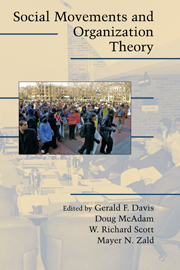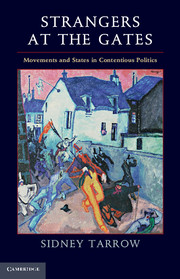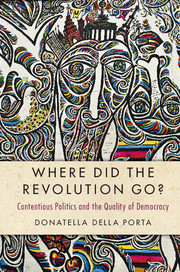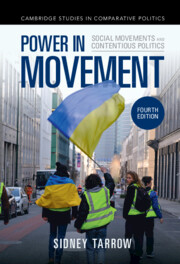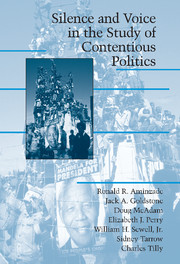Social Movements and Organization Theory
Part of Cambridge Studies in Contentious Politics
- Editors:
- Gerald F. Davis, University of Michigan, Ann Arbor
- Doug McAdam, Center for Advanced Study in the Behavioral Sciences, Stanford, California
- W. Richard Scott, Stanford University, California
- Mayer N. Zald, University of Michigan, Ann Arbor
- Date Published: May 2005
- availability: Available
- format: Paperback
- isbn: 9780521548366
Paperback
Other available formats:
Hardback, eBook
Looking for an inspection copy?
This title is not currently available for inspection. However, if you are interested in the title for your course we can consider offering an inspection copy. To register your interest please contact [email protected] providing details of the course you are teaching.
-
Although the fields of organization theory and social movement theory have long been viewed as belonging to different worlds, recent events have intervened, reminding us that organizations are becoming more movement-like - more volatile and politicized - while movements are more likely to borrow strategies from organizations. Organization theory and social movement theory are two of the most vibrant areas within the social sciences. This collection of original essays and studies both calls for a closer connection between these fields and demonstrates the value of this interchange. Three introductory, programmatic essays by leading scholars in the two fields are followed by eight empirical studies that directly illustrate the benefits of this type of cross-pollination. The studies variously examine the processes by which movements become organized and the role of movement processes within and among organizations. The topics covered range from globalization and transnational social movement organizations to community recycling programs.
Read more- Integrative literature reviews and commentaries are followed by state-of-the-art empirical studies of varied movements and organizations
- Organizations, in their modern configuration, now behave more like movements than their bureaucratic forbears
- Organizations and movements need to be viewed as two phases within the same, more general, process of creating and reforming social structures
Customer reviews
Not yet reviewed
Be the first to review
Review was not posted due to profanity
×Product details
- Date Published: May 2005
- format: Paperback
- isbn: 9780521548366
- length: 454 pages
- dimensions: 228 x 153 x 29 mm
- weight: 0.6kg
- contains: 16 b/w illus. 23 tables
- availability: Available
Table of Contents
Part I. Creating a Common Framework:
1. Organizations and movements Doug McAdam and W. Richard Scott
2. Where do we stand? Common mechanisms in organizations and social movements research John L. Campbell
Part II. Political and Mobilization Context:
3. Institutional variation in the evolution of social movements: competing logics and the spread of recycling advocacy groups Michael Lounsbury
4. Elite mobilizations for antitakeover legislation, 1982–1990 Timothy Vogus and Gerald F. Davis
5. Institutionalization as a contested, multilevel process: the case of rate regulation in American fire insurance Marc Schneiberg and Sarah A. Soule
6. From struggle to settlement: the crystallization of a field of lesbian/gay organizations in San Francisco, 1969–1973 Elizabeth Armstrong
Part III. Social Movement Organizations: Form and Structure:
7. Persistence and change among federated social movement organizations John McCarthy
8. Globalization and transnational social movement organizations Jackie Smith
Part IV. Movements Penetrating Organizations:
9. How do social movements penetrate organizations? Environmental impact and organizational response Mayer N. Zald, Calvin Morrill, and Hayagreeva Rao
10. Organizational change as an orchestrated social movement: recruitment to a corporate quality initiative David Strang and Dong-Il Jung
11. Subventing our stories of subversion Maureen A. Scully and W. E. Douglas Creed
Part V. Conclusion:
12. Social change, social theory, and the convergence of movements and organizations Gerald F. Davis and Mayer N. Zald
12. Two kinds of stuff: the current encounter of social movements and organizations Elizabeth Clemens.
Sorry, this resource is locked
Please register or sign in to request access. If you are having problems accessing these resources please email [email protected]
Register Sign in» Proceed
You are now leaving the Cambridge University Press website. Your eBook purchase and download will be completed by our partner www.ebooks.com. Please see the permission section of the www.ebooks.com catalogue page for details of the print & copy limits on our eBooks.
Continue ×Are you sure you want to delete your account?
This cannot be undone.
Thank you for your feedback which will help us improve our service.
If you requested a response, we will make sure to get back to you shortly.
×
